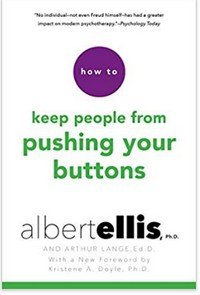To achieve anything in life, you have to make it a “must” ???
3. Can we be motivated without using absolutist, moralistic demands (shoulds, oughts, musts and why’s?) to whip ourselves into focused action?
4. Is it true that to achieve anything in life, you have to make it a “must”
5. What is the relationship, if any, between “sanity,” rationality, and success/achievement?
We have been having a fascinating, wide-ranging discussion which I think boils down to a few basic-but-important questions:
1. Is it necessary to avoid shoulds, oughts, musts and why’s? in everyday speech?
2 What is the difference between “task-perfection” and “self-perfection.”
3. Can we be motivated without using absolutist, moralistic demands (shoulds, oughts, musts and why’s?) to whip ourselves into focused action?
4. Is it true that to achieve anything in life, you have to make it a “must”
5. What is the relationship, if any, between “sanity,” rationality, and success/achievement?
Words don’t kill people, people kill people. Hehehe…
The only time that “must” (et al) is a problem is when it represents an
absolute, moralistic demand, and when such demands cause you to be judgmental
and angry toward others . . . or when you direct them at yourself and this causes you to feel guilty or shamed (rating, downing, self-deprecating). If you are not using “must” in this way to inflame yourself, then there isn’t a problem … Well, maybe not . . .
Except–and at the risk of confusing things–if you are inflaming yourself and not recognizing it or not acknowledging it. A friend of mine likes to upset himself about politics. Which is odd in that he is no more involved with politics than I am, which is to say not at all. In spite of the fact that he is a highly intelligent, MESA type character, he really needs to read “General Semantics For Dummies”! He carries on and on with all this hateful language about the politicians he does not favor, attacks them on a personal level; rating, downing, globalizing, labeling, judgments, absurd generalizations and over-generalizations. Inflamed about what they should be or not be doing. All the while insisting that what is MUST not be. Sometimes I ask him why he is so angry and he says “I’m not angry!” Go figure! The musty scale of 1-100 you refer to is reflected in how you feel. If you are not bringing your feelings into the loop (and you might as well since they are intrinsically part of the loop anyway), it is just word games. The point of challenging your distorted thinking is to change the way you feel. If going in, you are not clear about and connecting with how you feel, then how can you change it? When you change the way you feel, you behavior will tend to be more rewarding and fulfilling, and when that happens your circumstances and relationships are bound to change for the better.
 |
 |
Begin with your emotion: When you are pissed off about something, look for the “should.” When you begin to see, really see, the intimate relationship between how you think and how you feel, that anger and guilt is invariably provoked by “shoulds,” all of this will take on a much more vivid sense of reality and become less of an intellectual exercise.
As we have discussed before, conditional and predictive shoulds are not (usually) inflammatory. In conditions (in GS, REBT and in English grammar) it is the “if” that makes the difference:
|
Personally, I try to keep it simple. Why use this language at all if you can avoid it? As a discipline, I try to avoid using “shoulds” (obvious and disguised as “Why?” questions) in all of the many flavors and variations they come it.
Finally, some people thrive and succeed breaking all of the rules we discuss so often here. Read Steve Jobs biography. Steve’s MO often involved moralistic, absolutist demands, shoulds, judgments, disqualifying the positive. He managed by pronouncing ideas and solutions as either the best thing in the world or absolute shit, nothing in between. His story is almost like the “Alice Through the Looking Glass” version of REBT.
 |
 |
Jacobson, developer of Progressive Relaxation wrote “You must relax”, and while his work and his book are both important achievements in biofeedback, psychology, stress management and psychophysiology, the title sucks! How can you ever hope to relax if you are telling yourself that you “must” relax??? I mean, like “yuck!” ya know?
There is hardly 100% agreement to the REBT use of General Semantics. Even Dr. Ellis was inconsistent with the way he sometimes used or failed to use REBT-kosher language. “How to Live With a Neurotic.” My gawd, what on earth is ‘a neurotic’ ” ???
In regard to the REBT-dilemma presented by Tony Robbins insistence that to achieve anything in life, you have to make it a “must” Dr. Burns helps us out a little in tutoring us to distinguish between what he calls “task perfection” and “self-perfection.” In other words, in an achievement-driven society, motivation and an insistence on excellence may indeed be a good strategy, but if it is, let it reflect on behavior, not self. Task-failure does not imply personal failure, nor does task failure diminish self in any way.
But look at Robbins assertion that:
“to achieve anything in life, you have to make it a “must”
My gawd, in a 12 word sentence, there are three big-time” distortions!
Certainly motivation is an important personal trait, and in a success-driven, success-oriented society, success (whatever that means) is important. However, in my humble opinion, if it comes at the price of depression, anxiety, “workaholic” behavior, stress and stress-related diseases, disruption of family and relationships, then it may not be worth it. Perhaps it is possible to succeed and at the same time maintain our rationality, avoid corrupt semantics, deal with stress in a healthy way. What do you think?
 |
 |
Finally, in direct response to Tony Robbins and others in that field, I find it dubious that people can actually manufacture motivation on demand in a sustained way, no matter how many Tony Robbins books they buy or how many seminars they attend. People who are highly motivated seem to have it intrinsically, and/or as something they developed at an early age. Telling people who are not motivated that they “must” be motivated is telling them that they must feel something they don’t feel; it only adding layers of guilt on top of the guilt. Trying to beat them into success is not the solution in my humble opinion . . . but strategies that “unmotivated” people can employ to improve their mood and their circumstances is a big subject, and beyond the scope of this post.
Cheers,
Rex

PLEASE ADD YOUR COMMENTS AND QUESTIONS BELOW
We LOVE ![]() hearing fro, you…
hearing fro, you…
![]()
Originally posted 2013-02-25 23:01:10.
- I need you too much already, lah!:o{ - Thu 22 May 25
- Mortification of the Self - Thu 22 May 25

